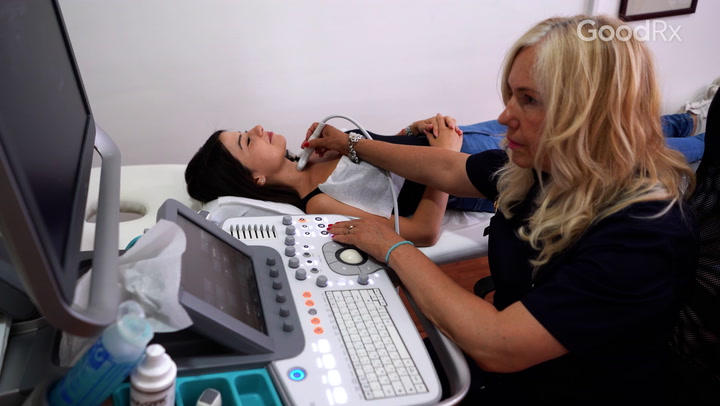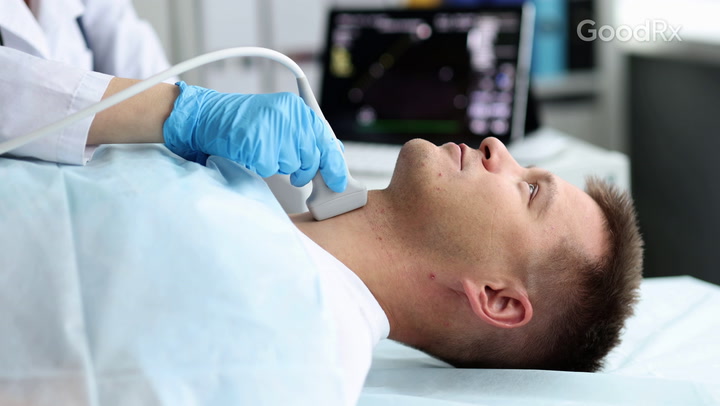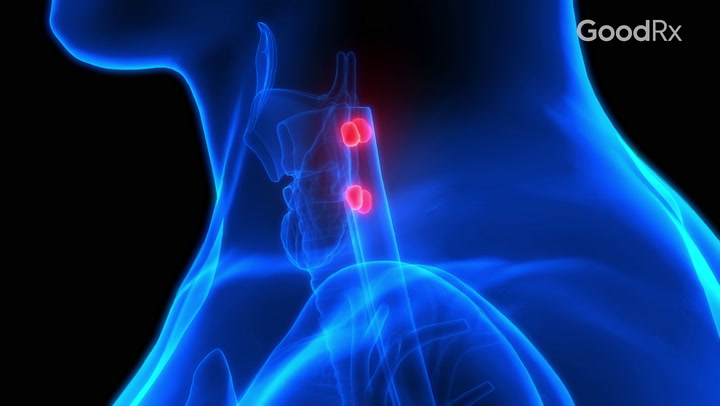
Hashimoto’s Thyroiditis vs. Hypothyroidism: Are They One and the Same?
Key takeaways:
Hashimoto’s thyroiditis is an autoimmune condition that affects the thyroid gland. It often leads to hypothyroidism.
Hashimoto’s and hypothyroidism have similar symptoms and often occur together. But they’re two different conditions.
Not everyone with Hashimoto’s will develop hypothyroidism, and not all cases of hypothyroidism are due to Hashimoto’s.
Hashimoto’s doesn’t always need treatment. If there’s a lot of damage to the thyroid gland, the treatment for Hashimoto’s and hypothyroidism can be similar.
Table of contents

Hypothyroidism is the most common form of thyroid disease and one of the most common diseases in the world. Hashimoto’s thyroiditis is the leading cause of hypothyroidism in the U.S. Because Hashimoto’s thyroiditis and hypothyroidism are linked, they’re sometimes used interchangeably. But they’re distinct conditions with different features.
What is Hashimoto’s thyroiditis?
Hashimoto’s thyroiditis is an autoimmune disorder affecting the thyroid gland. In this condition, your immune system mistakenly attacks and destroys your thyroid gland cells. Most people with Hashimoto’s have created antibodies against the thyroid gland. These antibodies can damage the thyroid and lead to hypothyroidism in many cases.
Hashimoto’s thyroiditis can affect anyone. But some people are more likely than others to have this condition:
Females, especially between the ages of 30 and 50 years old
People with a family history of Hashimoto’s
People with other autoimmune disorders, like lupus, Type 1 diabetes, or rheumatoid arthritis
What are the symptoms of Hashimoto’s thyroiditis?
Symptoms of Hashimoto’s thyroiditis can vary. Many times, symptoms of Hashimoto’s disease look like the symptoms of hypothyroidism. That’s because Hashimoto’s will often result in an underactive thyroid.
Some of the more common symptoms associated with hypothyroidism from Hashimoto’s include:
Cold intolerance (feeling cold when others aren’t)
Muscle aches
A slower heartbeat than normal
Dry skin and hair
Chipped or peeling nails
Hypothyroidism causes: Hashimoto’s is the most common cause of an underactive thyroid — but it’s not the only one. Learn about other causes of hypothyroidism.
What to eat for Hashimoto’s disease: This registered dietitian living with Hashimoto’s has customized a diet that supports her well-being. She shares her tips here.
Diagnostic delays: Discover the story of how one woman lived with undiagnosed Hashimoto’s thyroiditis for decades before getting a diagnosis.
Sometimes, you can detect Hashimoto’s very early in the disease process. In this stage, the attack on your thyroid can lead to an overactive thyroid (hyperthyroidism). In these instances, symptoms of Hashimoto’s thyroiditis can look like:
Weight loss
Muscle weakness
Irritability
Less frequent periods
How do you know if you have Hashimoto’s thyroiditis?
Your primary care provider will use your medical history and a series of tests to make the diagnosis of Hashimoto’s thyroiditis. If you have symptoms of thyroid disease or a goiter (swelling of the thyroid gland), you’ll likely need more tests. This may include blood work, imaging studies, or a combination of the two.
Common lab tests for Hashimoto’s disease include:
Thyroid stimulating hormone (TSH)
Thyroxine (T4)
Triiodothyronine (T3)
Thyroid peroxidase antibodies (TPO)
Thyroglobulin antibodies (TgAb)
TSH receptor antibodies
Many people with Hashimoto’s disease will test positive for TPO or TgAb. But about 5% of people with Hashimoto’s thyroiditis won’t have any antibodies detected.
Sometimes, an ultrasound can help make the diagnosis of Hashimoto’s thyroiditis. The imaging may also include a fine-needle biopsy of thyroid tissue to confirm the diagnosis. This is often helpful when there’s a goiter or when thyroid lab tests are normal.
Hashimoto’s disease vs. hypothyroidism: What’s the difference?
Hashimoto’s and hypothyroidism are closely linked. But the main difference between Hashimoto’s and hypothyroidism is the cause of each condition:
Hashimoto’s disease is the most common cause of hypothyroidism. It happens when your immune system attacks your thyroid gland. But it doesn’t always result in hypothyroidism.
Hypothyroidism is when your thyroid is underactive and not producing enough thyroid hormone. Hypothyroidism can happen as a result of Hashimoto’s, but not all cases of hypothyroidism are due to Hashimoto’s. There are many other causes, too.
What causes Hashimoto’s hypothyroidism?
Hashimoto’s disease is the result of your body making antibodies that attack the thyroid. This is what makes it an autoimmune disorder.
Antibodies are an important part of the body’s immune system. They're designed to fight off cells in the body that don’t belong.
But in Hashimoto’s, the body creates antibodies that mistakenly attack the thyroid. Sometimes, this destruction is so widespread that it leads to hypothyroidism (but not always).
Scientists still aren’t exactly sure what triggers the immune system to attack the thyroid in Hashimoto’s disease. It seems that some people have a genetic tendency to develop Hashimoto’s. And it often runs in families.
There are also theories about other factors that might increase your risk of Hashimoto’s disease. These include:
Infection
Pregnancy
Change in iodine intake
Certain medications that trigger autoimmune responses
What can cause hypothyroidism?
It's not just Hashimoto’s thyroiditis that causes hypothyroidism. Anything that prevents your thyroid from producing enough thyroid hormone can lead to hypothyroidism. Several other causes of hypothyroidism include:
Thyroid cancer
Medications (like lithium and amiodarone)
Radiation treatment
Congenital hypothyroidism (from birth)
Are treatments for Hashimoto’s disease and hypothyroidism the same?
Treatment for Hashimoto’s thyroiditis and hypothyroidism can be the same in some cases. This depends on whether the damage to the thyroid gland from Hashimoto’s is severe enough to cause hypothyroidism. If so, treatment will typically include thyroid hormone replacement medication, like levothyroxine (Synthroid).
Treatment of hypothyroidism is necessary for the body to function normally. Untreated hypothyroidism from any cause can lead to serious complications. This can include:
Mental health changes
Infertility
Heart disease
Nerve damage
Death (in severe cases)
If your Hashimoto’s disease isn't advanced and hasn't caused significant damage to your thyroid, you may not need any treatment. Your healthcare team may choose to monitor your thyroid function regularly and check to see if you develop any symptoms.
Frequently asked questions
Yes. Hashimoto's thyroiditis is the most common cause of hypothyroidism. But not all cases of Hashimoto’s disease lead to hypothyroidism.
Like with other causes of hypothyroidism, the symptoms of Hashimoto’s can be vague. Many aspects of your health and well-being could be affected by the disease, such as your:
Energy levels
Hair and nails
Weight
Mood
Sleep
Digestion
Menstrual periods
It can be hard to piece it all together.
As a result, Hashimoto’s can easily be mistaken for other conditions, including but not limited to:
Premenstrual syndrome (PMS)
The bottom line
Hashimoto’s disease often leads to hypothyroidism, but this can vary from person to person. Some people have normal thyroid function early on in Hashimoto’s, but they go on to develop hypothyroidism. Others never progress to hypothyroidism at all. Your primary care provider or endocrinologist will check you regularly for symptoms and any changes in your lab tests. This will give them clues about your thyroid function and help them develop a treatment plan that’s best for you.
Why trust our experts?


References
American Thyroid Association. (n.d.). Goiter.
American Thyroid Association. (n.d.). Hashimoto’s thyroiditis (chronic lymphocytic thyroiditis or autoimmune thyroiditis).
American Thyroid Association. (n.d.). Hyperthyroidism.
American Thyroid Association. (n.d.). Summaries for the public from Clinical Thyroidology (from recent articles in Clinical Thyroidology).
Chiovato, L., et al. (2019). Hypothyroidism in context: Where we’ve been and where we’re going. Advances in Therapy.
Chistiakov, D. A. (2005). Immunogenetics of Hashimoto's thyroiditis. Journal of Autoimmune Diseases.
MedlinePlus. (2023). Thyroid antibodies.
Mincer, D. L., et al. (2023). Hashimoto thyroiditis. StatPearls.
National Institute of Diabetes and Digestive and Kidney Diseases. (2021). Hashimoto's disease. National Institutes of Health.

























